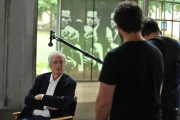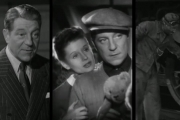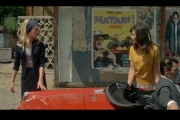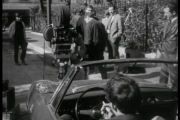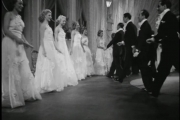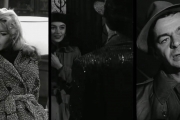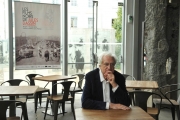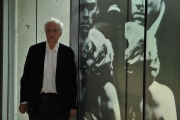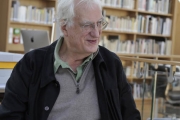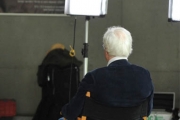![]() Presentation by and discussion with director & screenwriter Bertrand Tavernier, music composer Bruno Coulais and journalist Elsa Boublil
Presentation by and discussion with director & screenwriter Bertrand Tavernier, music composer Bruno Coulais and journalist Elsa Boublil
“I had the opportunity to see Bertrand Tavernier and share his very personal approach to French cinema, his French cinema. He has made an extremely precise and detailed film about Jacques Becker, Marcel Carné, music in the French cinema of the 30s, Jean Renoir and so many other filmmakers. It is a remarkable work, made with great intelligence. It is enlightening about classic French cinema, and about many forgotten or neglected filmmakers. It is a very precious work. You are convinced that you know all that by heart, until Tavernier comes along to reveal to us the pure beauty of it all.” Martin Scorsese
• César nomination for the best documentary, 2017 •
Cast & Crew
Director • Bertrand Tavernier
Directors of Photography • Jérôme Alméras, Simon Beaufils, Julien Pamart, Camille Clément and Garance Garnier
Screenwriters • Bertrand Tavernier, Thierry Frémaux and Jean Ollé-Laprune
Producers • Frédéric Bourboulon
Composer • Bruno Coulais
 The Cultural Service of the French Embassy:
The Cultural Service of the French Embassy:
Supporting Contribution for Documentary Screenings
Choose a picture to see the filmography (source : IMDB)
![]()
How can one comment on what is in itself an analysis, a commentary, passions . . . ?
It is hard to talk about how the film was elaborated, gradually illumined, how it took on this shape and not another, took on its own life as we mulled over excerpts, grappled with material problems, with copyright issues (which obliged me to explore new routes, and required numerous rewrites). But should I be the one to write that? Or someone like Emmanuelle Sterpin (First Assistant Director and researcher), or Guy Lecorne (editor), who can testify to our absence of blinders and prejudices, to our frank sincerity and also to our bursts of enthusiasm?
You wanted to talk about French cinema, and so you knew in advance which authors you would have to eliminate, and those whose praises you were going to sing?
Well no, I admit humbly, no. I explored, looked again, discovered, and I let films and filmmakers impose themselves, find their own space. One name led to another. Carné conjured up Jaubert and Renoir, Kosma.
Yes, I obviously knew that I would declare my admiration for Renoir, Becker, and Gabin, and all of a sudden my friend Edmond T. Gréville popped up, and Jean Sacha. And then that film by Grangier, with its extraordinary autobiographical stroke of lightning. I wanted to show that with filmmakers who are so very different, we still find the same passion, the same desire to experiment, the same respect for the public, and the same desire to treat them like adults. I expressively wanted to react as a filmmaker myself to what touches me in films, by very different auteurs, evoking the depth of a Renoir frame, the way Carné appropriates a splendid dramaturgical idea of Trauner’s, the influence of Welles on Jean Sacha. I can identify with Greville’s stupefaction at an actor’s request (to play a legless cripple), that could perturb the entire shoot.
I want this journey to be lively and fun, to awaken the desire to see hundreds of films again. I want to show that intransigence is found in filmmakers who are so very different from each other: Carné in Le Jour se lève, but also in the Delannoy of Macao, of Savage Triangle, and in certain frames of This Man is Dangerous.
I want to convey a sense of the creative verve that existed at 9 rue Kepler. I rubbed shoulders there for more than three years with Varda, Demy, Godard, Chabrol, Schoendoerffer, Rozier. To sketch a portrait of Melville, who with Claude Sautet was my godfather in the cinema. Of Melville and the studios in the Rue Jenner. Blessed are those who discovered cinema in those studios.
A memory
It was on set at the Studio Jenner. The set was completely empty, except for some huge photographic enlargements of American façades that were going to be used as the view from the windows in The Doulos.
And in front of those buildings and fire escapes, Jean-Pierre Melville and I spoke about Cocteau, and I can still hear him say to me: “Cocteau was first and foremost what every French creator should be: a French ambassador to France”. A magnificent statement that I would like to use in this Journey Through French cinema, this exercise in admiration and gratitude. As Victor Hugo once said, “in admiration there is a je ne sais quoi of consolation.”
Press Kit “Voyage à travers le cinéma français”
English ~ 8 pages ~ 1,7 Mo ~ pdf
Press Kit “Voyage à travers le cinéma français”
French ~ 8 pages ~ 1,7 Mo ~ pdf




